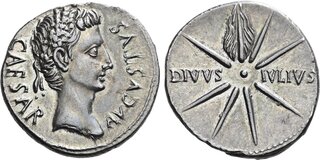| Numismatica Ars Classica > Auction 143 | Auction date: 7 May 2024 |
| Lot number: 447 Price realized: This lot is for sale in an upcoming auction - Bid on this lot  | Show similar lots on CoinArchives Find similar lots in upcoming auctions on |
| Lot description: The Dioscuri Collection. The Roman Empire. Octavian 32 – 27 and as Augustus, 27 BC – 14 AD. Caesaraugusta Denarius circa 19–18 BC, AR 19 mm, 3.80 g. CAESAR – AVGVSTVS Oak-wreathed head r. Rev. DIVVS – IVLIVS Eight-rayed comet with tail upwards. C 98 var. (laureate). BMC 323. RIC 37a. CBN 1297. Wonderful old cabinet tone and good extremely fine Ex NFA XXV, 1990, 325; NAC-Spink Taisei 16th November 1994, Steinberg, 138 and Triton XIV, 2011, 613 sales, From the G.K. collection. This denarius is thought to be another issue struck at the colonial mint of Caesar Augusta in Spain. As on the preceding piece, the emperor is depicted wearing the corona civica on the obverse and named in the legend as Caesar Augustus. The reverse, however is a spectacular type that celebrates the original source of the emperor's power, while he was still known as Octavian and before the settlement of 27 BC made him Augustus. The large star with a clear tail depicted on the reverse represents the famous sidus Iulium (literally the "star of Julius")-a great comet that appeared in the sky for seven days in July 44 BC as Octavian was celebrating the ludi Victoriae Caesaris, games instituted at Rome to celebrate the many victories of Julius Caesar. Although Caesar had been assassinated several months earlier, on the Ides of March, as his adoptive heir Octavian held the games as an act of filial piety and as a means of galvanising support against the Liberators. The timing of the comet could not have been better. Octavian immediately seized upon the celestial event and declared it to be the spirit of the dead Caesar ascending to the heavens. Thus, Caesar had clearly risen to the ranks of the gods, as indicated by the legend of this coin, which identifies the star as the Divine Julius. Thenceforth, Octavian bolstered his political position by not only presenting himself as the son of Caesar, the great man, but as the son of Caesar the god. This transition of Julius Caesar from murdered dynast to god was celebrated by the disgraced Augustan poet Ovid, who included the sidus Iulium in his Metamorphoses. In his account "... kindly Venus, although seen by none, stood in the middle of the Senate-house, and caught from the dying limbs and trunk of her own Caesar his departing soul. She did not give it time so that it could dissolve in air, but bore it quickly up, toward all the stars of heaven; and on the way, she saw it gleam and blaze and set it free. Above the moon it mounted into heaven, leaving behind a long and fiery trail, and as a star it glittered in the sky." Estimate: 8000 CHF |  |



